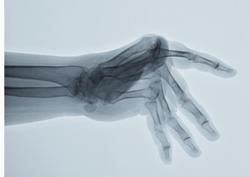Is There Truly a Therapeutic “Window of Opportunity” in RA?
Rheumatoid arthritis studies differ in definitions of symptom onset and progression, designs, and outcomes, but agree on the early treatment timing: 12 weeks.
Van Nies JA , Krabben A, Schoones JW, el al,What is the evidence for the presence of a therapeutic window of opportunity in rheumatoid arthritis? A systematic literature review.
Ann Rheum Dis. (2013) Apr 9. [Epub ahead of print]
It is widely believed that the so-called “window of opportunity” for early treatment of rheumatoid arthritis early to help avoid or lessen joint damage and produce disease remission is during the first 12 weeks after the onset of symptoms. A qualitative review of the literature suggests that this perception is accurate.

After reviewing the literature that focuses on two outcomes of early RA treatment, complete disease remission and joint damage progression seen on radiography, Dutch researchers say that (despite lack of a single definition of symptom onset) that the majority of studies find similar results for treatment initiated during this early interval.
The researchers systematically reviewed medical literature databases up to June 2012, selecting 18 studies that reported outcomes of early RA treatment in relation to symptom duration. The studies encompassed 6,615 patients (40-895 in individual studies), the majority of them women over age 50 treated with conventional DMARDS and followed for up to two years.
The studies had varying designs (including randomized trials and cohort studies) and outcomes, symptom durations ranging from less than 3 months to 11.7 months, and different definitions of remission and radiographic progression.
In spite of these limitations, the researchers found strong evidence that longer symptom duration in early RA patients was independently associated with reduced chances of DMARD-free sustained remission and with severe joint damage progression. Three-fourths of the studies reported effects in the same direction.
A separate meta-analysis on achieving DMARD-free sustained remission also found an independent association for symptom duration, supporting the 12-week hypothesis.